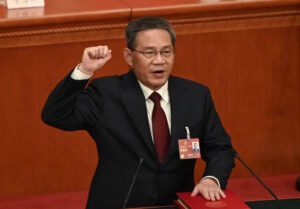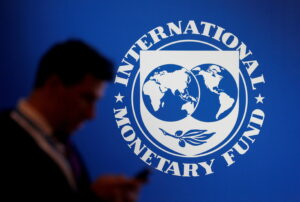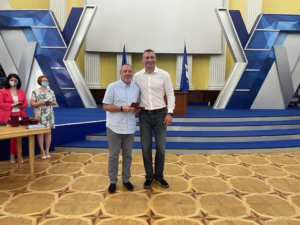
The session of the National People’s Congress (NPC) elected Li Qiang as the new Premier of the State Council of China.
He was nominated by Chinese President Xi Jinping, who was re-elected for a third term the day before.
Li Qiang, born in 1959, was head of the Shanghai Municipal Committee of the CPC from 2017-2022. From 2016-2017, he was head of the CPC Party Committee of Jiangsu Province, and from 2012-2016. – Governor of Zhejiang Province.
He succeeded Li Keqiang, who had led the Chinese government since 2013, as head of the cabinet.
The plenary session also elected deputy chairmen of China’s Central Military Council. They were Generals Zhang Yuxia and He Weidong.
Liu Jingguo will head the State Supervision Committee of the PRC, Zhang Jun was elected chairman of the Supreme People’s Supreme Court of the PRC, and Ying Yong was elected chairman of the Supreme People’s Procuratorate.
At a plenary session on Sunday, deputies elected deputy prime ministers of the State Council of the PRC and the new composition of the cabinet.

Consumer price growth in Ukraine slowed to 0.7% in February 2023 from 0.8% in January, returning to the level of December last year, the State Statistics Service (Gosstat) said on Friday. According to its data, 1.6% inflation was recorded in February-2022, so in annual terms in February-2023 it fell to 24.9% from 26% in January and from 26.6% in December last year.
Core inflation in the past month fell to 0.5% from 0.7% in January and 0.8% in December 2022, the Gosstat said.
With core inflation at 1% in February 2022, year-over-year core inflation also fell to 22.7% in January from 23.3%, just above last year’s 22.6%.
In the consumer market in February, prices for food and non-alcoholic beverages have increased by 1.5%. Vegetables went up most of all (by 13.9%). Fruit, poultry, fish and fish products, bread, milk and dairy products, pasta and soft drinks rose by 1.4-0.4%. At the same time, processed cereal products, eggs, rice, bacon, beef, pork and sunflower oil went down in price by 2.3-0.4%.
The prices of alcoholic beverages and tobacco products rose by 1.1%, including tobacco products – by 1.4% and alcoholic beverages – by 0.9%.
Clothing and footwear fell in price by 3.2%, including clothing by 3.2% and footwear by 3.1%.
An increase in prices in the health sector by 0.8% was primarily due to a 1.6% increase in the cost of outpatient services and hospital services.
Transport prices fell by 1.7% due to the decline in fuel and lubricants by 5.3%, as well as train fares by 1.5%.
As it was reported in January, the National Bank of Ukraine improved its inflation forecast for this year from 20.8% to 18.7%, including down to 23.6% in the first quarter and to 18.7% in the first half of the year.
The government this week also reported that its inflation forecast for the current year has been lowered to 24% from 28%.

An International Monetary Fund (IMF) mission on Wednesday begins discussions with Ukraine’s representatives on a new full-fledged support program involving funding from the Fund.
“The IMF mission led by Gavin Gray begins discussions today with representatives of the Ukrainian authorities on a potential program to be supported by the IMF,” Vahram Stepanian, IMF Resident Representative in Ukraine, said in a statement.
Earlier, Ukrainian Finance Minister Sergei Marchenko announced the work of the IMF mission from March 8 to 15 in Warsaw.
“There we will agree on the terms and conditions, and filling, and volumes, and so on. Now it’s a little early to talk about specific details, because there are a lot of issues of internal discussion of the Fund,” said the head of the Ministry of Finance on March 1.
“I think we will find the necessary solutions so that in April we could have a full-fledged program with the Fund,” said Marchenko.
According to him, so far we are talking about a four-year program, whose task is to make the necessary policy adjustments so that Ukraine, which today spends 50% of its budget on military expenditures and the other 50% financed by the aid of partners, after the war came to a level of “more or less” self-sufficiency.
“The Fund does not yet put forward unbearable conditions that we cannot fulfill. We are talking about program, basic things: ensuring monetary and fiscal stability; reduction of the budget deficit and ensuring an acceptable level of burden on the budget and also good public administration and ensuring best corporate practices. And we are talking about anti-corruption programs, which have traditionally been part of IMF programs,” explained the head of the Ministry of Finance.
Prime Minister Denis Shmygal stated that the amount of the program may amount to $15 billion, of which Ukraine would like to receive $5 billion this year.
As earlier reported, last autumn, when the IMF was not ready to provide substantial financing at once, Ukraine requested a four-month Monitoring Program with Board of Directors (PMB) from the Fund, which the Fund approved on December 20.
An IMF mission concluded in Warsaw on Feb. 17, resulting in a statement that a staff-level agreement (SLA) had been reached to end that program early and move forward with preparations for a new, expanded program involving financing.
Kiev hopes that in the beginning of the second quarter of 2023, the PMB will be replaced by a multiyear extended funding program EFF amounting to about $15 billion, which can cover the gap in covering the $ 38 billion deficit of the state budget-2023, which is now, according to about $5-10 billion.

People’s deputies propose to the Verkhovna Rada to abolish the state registration of used cars by the trading organization in itself, said the head of the parliamentary committee on finance, tax and customs policy Daniel Getmantsev
“Together with colleagues introduced the bill N9083, which provides for the deregulation and detenalization of the market of trade in used vehicles,” he wrote in the Telegram-channel on Monday.
According to the VR website, the bill on amendments to some laws of Ukraine on improvement of wholesale and retail trade in vehicles by business entities, which are registered in the Main service center of the Ministry of Internal Affairs, was introduced in the parliament by a group of MPs on March 6.
Among the co-authors of the bill, in particular, MPs Yaroslav Zheleznyak (faction “Voice”), Maryana Bezuglaya, Eugene Bragar (“Servant of the people”), Dmitry Razumkov (unaffiliated).
“The abolition of senseless state registration of used cars by a trading organization in its own name, even if it buys them as goods for further resale, will be a pledge to withdraw from the shadow market, expand the activity of white car traders and eliminate schemes because of which the budget is underpaid taxes,” Hetmantsev wrote.

The number of employees in the top 50 IT-companies in the period from August 2022 to January 2023 decreased by 5.3% to 92.4 thousand due to relocation in foreign offices of companies and legalization abroad, such research results were published on the DOU website on Monday.
According to him, most companies have up to 25% of their Ukrainian team members abroad.
“As the companies explained, the reduction, with some exceptions, does not mean a reduction in the number of specialists in the company. The IT specialists moved abroad to work in other offices of their own companies, they legalize there and stop paying taxes in Ukraine,” reads the text of the research.
Its authors recall that before the full-scale war, in January 2022, 50 largest IT-companies employed 100.3 thousand people, and in January 2021 – 76.3 thousand people.
It is noted that mostly companies began to actively legalize abroad it is technical specialists. If in the first half of 2022 the number of technical specialists was kept at the same level, in the second half there is a clear negative trend: minus 4.6 thousand specialists. The total number of technical specialists in the top 25 IT companies in January 2023 was 57.9 thousand compared to 62.5 thousand in January 2022.
In the five largest companies (Epam Ukraine, SoftServe, GlobalLogic Ukraine, EVOPLAY, Luxoft) the number of specialists decreased by 3.3 thousand in the second half of 2022, according to the study.
In particular, in company Epam Ukraine which occupies the first step in DOU rating, the number of working specialists decreased on 1260 persons in the first half-year of 2022 and 1225 in the second – to present 11,375 thousand persons (working in Ukraine or continuing to pay taxes in Ukraine even in case of moving abroad). The number of technical specialists of the company decreased by 9% to 10.4 thousand people. It is noted that some of the company’s specialists left Ukraine to escape the war and remain there. Jobs for EPAM in Ukraine today are few, because the need for specialists will be covered mainly through bench – internal specialists of the company, the material says.
The number of employees in Ukraine SoftServe (2nd place) decreased by 164 people in the first half of 2022 and by 1468 people in the second half – to 9.45 thousand people. The company has 22% fewer technicians (7,393). These changes are also explained by relocation: about 2 thousand SoftServe specialists moved abroad after the start of the full-scale invasion. Some of them returned, but many of them still stay abroad and now legalize in other locations of the company. Also, according to the DOU, there is some optimization going on, but not a massive one.

The Kiev Municipal Clinical Oncology Center received about 30,000 patients in 2022.
As acting director of the oncology center Alexander Klusov told the agency, the clinic was able to restore the patient flow that fell after the start of the full-scale invasion of the Russian Federation as early as July 2022.
“In 2022, we had about 30,000 patients, only 6,000 fewer than in 2021 and actually comparable to what we had two or three years ago. Understandably, since the beginning of the active invasion, we have tried to discharge all patients except those who were in serious condition and needed inpatient medical care. The number of patients was not reduced many times as it is now in many medical institutions. We can say that we have already reached the pre-war level in July”, – he said in an interview to “Interfax-Ukraine”.
At the same time Klusov pointed out that during the last year the number of patients who come to the clinic from other regions decreased a little.
At the same time, the center actively provides medical assistance to internally displaced persons (IDPs), who can receive medical care at the oncology center as well as Kyiv residents.
“We understand migration processes and try to provide medical care to everyone who needs it,” he said.
At the same time, Klusov noted that “the reform of the healthcare system allows specialized medical institutions not only to work, but also to develop.”
“We even buy diagnostic and therapeutic equipment, and our salaries are among the highest among the medical institutions of Kiev. Of course, we have the opportunity to use the funds from two budget programs – state and local budget programs, including the purchase of chemotherapy drugs. This is a very serious help, because the purchase of chemotherapy drugs requires significant resources,” he said.